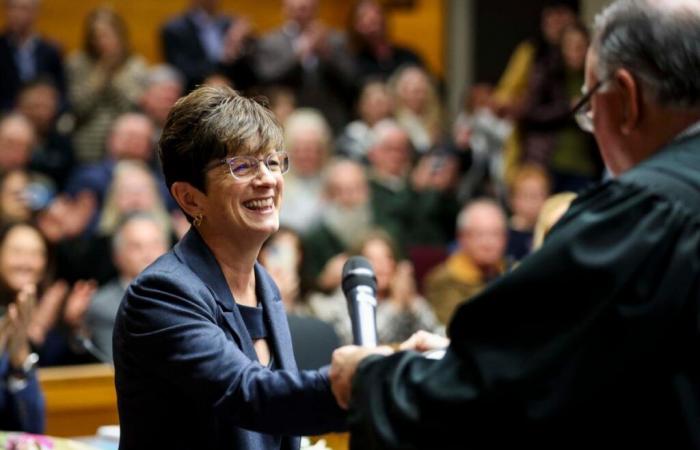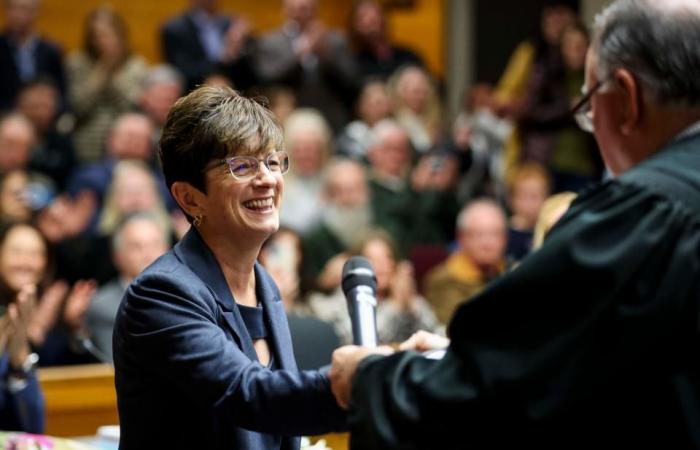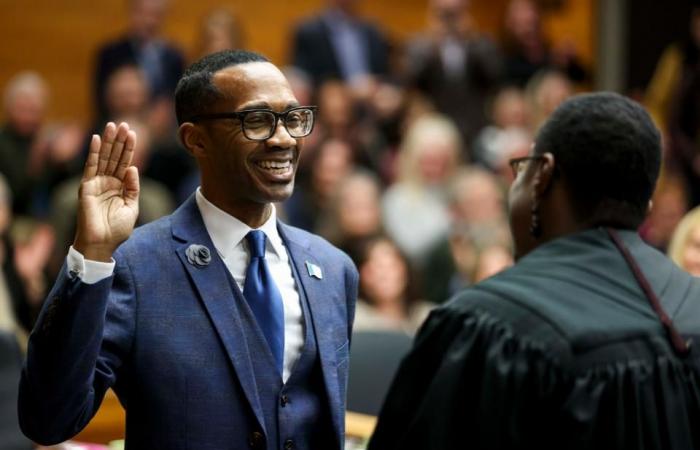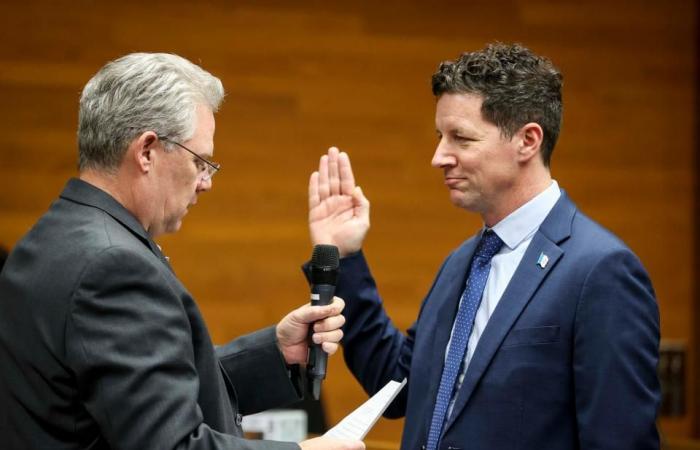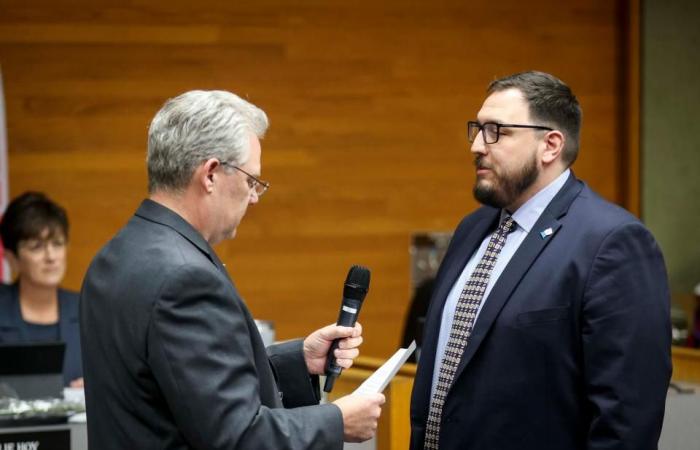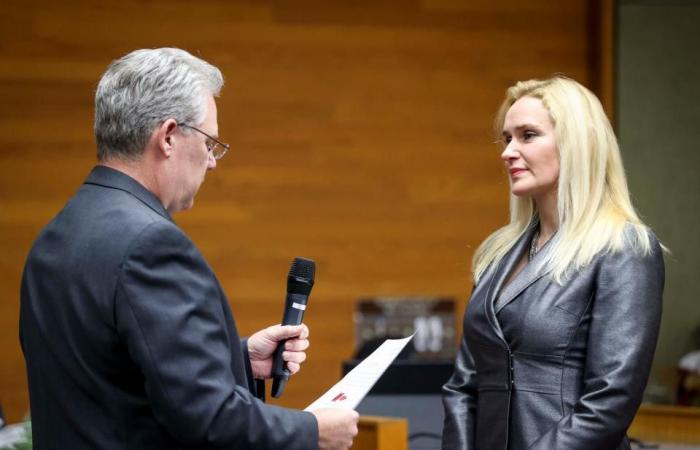More than 140 people packed into Salem City Council chambers Monday night for the swearing-in ceremonies of new Mayor Julie Hoy, new councilors Paul Tigan, Shane Matthews and Irvin Brown, and continuing councilor Vanessa Nordyke.
The excitement in the crowd was clear. People wore matching black sequined outfits, buttons with Hoy’s face and visited her new office to write notes of encouragement on her wall.
The standing-room-only crowd broke out in applause when she banged her gavel to start the meeting.
People pack into the Salem City Council chambers to watch Mayor Julie Hoy and city councilors be sworn into office on Monday.
“It felt hopeful,” Hoy said the morning after the meeting.
She said the discussion following the ceremony was constructive and collegial, with the new and returning councilors bringing their perspective and input to the issues on the agenda.
“I think they all did a beautiful job,” she said.
The meeting felt light-years away from some of the more acrimonious ones of recent years. The council has traded barbs over a proposed payroll tax, a mayor’s race won by a sitting councilor over an incumbent and Hoy and Councilor Deanna Gwyn being publicly censured for their votes involving a campaign donor.
“It was very divided,” Hoy said. “I will do whatever I can to keep that from happening.”
Salem Mayor Julie Hoy on communication, homelessness, livability issues
Hoy, who was the previous Ward 6 councilor and is co-owner of Geppetto’s Italian Restaurant, said she thinks her willingness to listen struck a chord with voters last May. She stressed that relationship building and communication will be key going forward to address issues like homelessness, the budget and public safety.
She highlighted housing and homelessness as the number one issue facing the city.
“Not everyone is living with that inherent sense of safety,” Hoy said. “It’s important to hear the voices that don’t and to do something about that.”
She recounted doing a ride-along with Salem Fire Station #3 on New Year’s Eve and watching as the crews responded to a fire at an unmanaged camp that fully engulfed a structure and severely burned a woman in her sleeping bag.
Julie Hoy is sworn in as mayor of Salem by former Oregon Supreme Court Chief Justice Paul J. De Muniz.
The encampment, sandwiched between a highway wall and an apartment complex in east Salem, was wet and full of rats and human waste.
“The situation is just unsanitary and unsafe — mostly for the people living in it,” she said. “That should not be happening.”
Hoy said she wants livability for everyone: the people living next to the encampment, the people living in the encampment and those responding to the encampment.
She also pointed to recent livability issues faced by people living and working at the Safeway on Center Street. If left unaddressed, she fears the store would close, leaving downtown residents without a spot to walk and get groceries.
“Maybe I am the ‘livability mayor,’” she joked.
New Salem City Council members talk hopes, plans for 2025
The crowd didn’t turn out at Monday’s meeting only for the new mayor. The four swearing-in ceremonies for the councilors drew roars of applause. U.S. District Court Judge Adrienne Nelson, the first African-American to serve on the Oregon Supreme Court, gave the oath of office for Brown, the first African-American man elected to Salem City Council.

Ward 5 City Councilor Irvin Brown is sworn into office by U.S. District Court Judge Adrienne Nelson.
The new councilors also highlighted their hopes for 2025.
Tigan said he is focused on the council’s responsibility to work together to pass a balanced budget and bring long-term financial stability to the city.
“We have some big decisions to make between now and July 1, our deadline to pass a balanced budget for 2026,” said Tigan, who once served on the budget committee. “My goal is to build strong working relationships with my colleagues on the council, find common ground on solutions, and give residents clear and consistent information and updates as we move forward.”
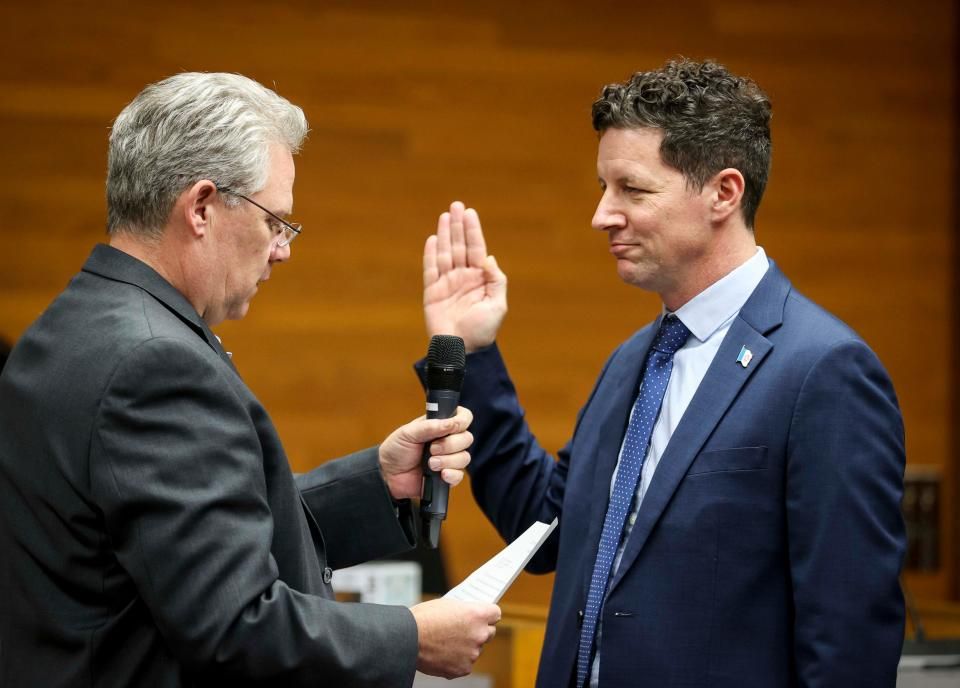
City Attorney Dan Atchison swears in Ward 1 City Councilor Paul Tigan.
He said he aims to do so by connecting with residents and neighborhood associations to talk about the budget, scale of the deficit, possible responses and what would need to be cut to resolve budget shortfall.
-“I don’t think it’s possible to communicate too much on this: both delivering the hard numbers as we see them on council, and also listening to our residents about what kind of city they want to wake up in on July 1st,” Tigan said.
Matthews also underscored the importance of collaboration and creating trust.
“There is so much divisiveness at the local, state, and national levels, which is paralyzing our effectiveness as civic leaders,” he said. “I hope to play my part to bridge the divide and start a new era of leaders who are working on policies that work for everyone.”
Short term, Matthews said his focus will be on the budget.
“It is no secret that we face a budget shortfall,” he said. “I want to lend my expertise in finding ways to be more innovative, efficient, and agile with our revenue.”
He said he also wants to hone in on responding to the drug crisis.
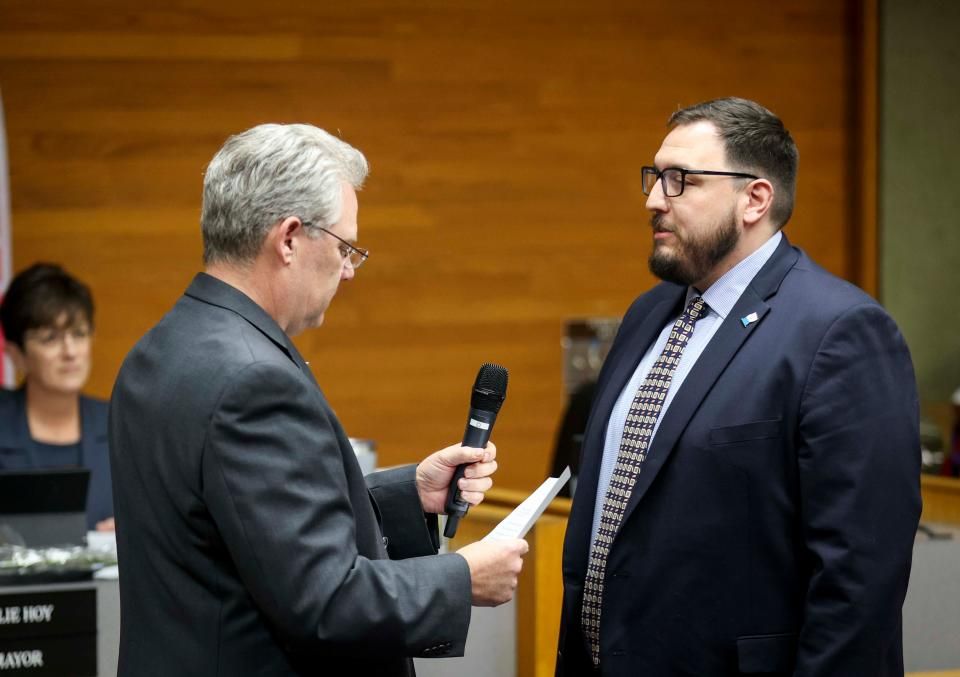
City Attorney Dan Atchison swears in Ward 3 City Councilor Shane Matthews.
“We need a police force that is appropriately resourced and tuned to proactively go after the drug dealers in our communities who are preying on vulnerability and addiction,” Matthews said. “Salem needs to be an unpleasant place to sell illegal drugs.”
Brown said he hopes to create a new culture among council and city staff of collaboration, empathy, healthy compromise and collegiality.
He also wants to restore trust with voters and gain buy-in from all communities through listening sessions, social media and town halls.
As the budget chair, the primary goal is to get the city out of its multi-million dollar deficit, Brown said.
“This will be priority No. 1 for the mayor and council,” he added.
He emphasized the importance of prioritizing public safety and working collaboratively with the city, county, staff, local businesses, school district and faith communities to grow a strong and diverse economy, maintain infrastructure and focusing on environmental stewardship.
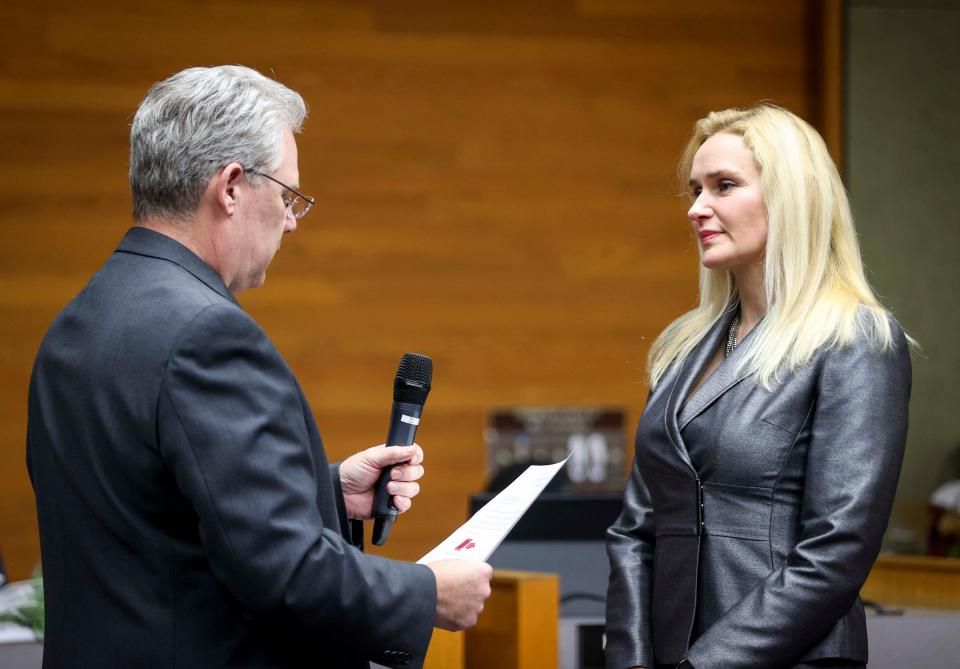
City Attorney Dan Atchison swears in Ward 7 City Councilor Vanessa Nordyke.
Nordyke, who won reelection in May, said Salem faces a serious livability gap and housing crisis.
“We as elected officials have a lot of choices to make this year,” she said. “The decisions that we make in this room will impact everyone, but they always, always tend to impact our most vulnerable the most. I want to congratulate my new peers on council and my new mayor because this is the year where the decisions we make will help determine the trajectory of this city.”
‘What I am going to do with each and every day?’
Hoy said she feels optimistic after the constructive conversation on Monday to create a Budget Efficiencies Committee suggested by the Salem Area Chamber of Commerce in a Dec. 11 letter to the city.
The results of the updated financial forecast that predicts Salem will face a $13.8-million budget shortfall in the upcoming fiscal year instead of the previous estimate of $17.7 million also proved promising. The estimated shortfall changed after input from a Forecast Review Team.
Hoy said she hopes to see more collaborative work with the community change the city’s financial narrative.
While preparing to take office, Hoy was selected to participate in the Bloomberg Center for Cities at Harvard University’s Program for New Mayors: First 100 Days, where she met with 23 other mayors and learned about problem-solving and innovation.
Each mayor was gifted a clock counting down their days in office. On Tuesday morning, Hoy’s read 727 days, 11 hours and 56 minutes.
Rather than be daunted by the countdown, Hoy said she asks herself, “What I am going to do with each and every day?”
“Last night, I think good things happened,” she said. “That’s my hope. You just keep doing good things every day.”
For questions, comments and news tips, email reporter Whitney Woodworth at [email protected], call 503-910-6616 or follow on X at @wmwoodworth
This article originally appeared on Salem Statesman Journal: Salem Mayor Julie Hoy, city councilors on goals for 2025

